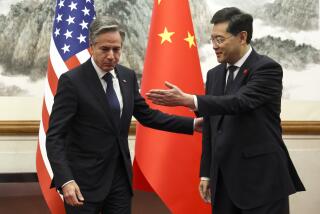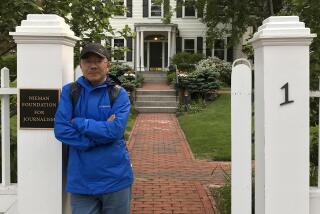Students Help Chinese Envoy Defect to U.S.
- Share via
WASHINGTON — A young Chinese diplomat said Friday that he is defecting to the West and, at an extraordinary press conference sponsored by a student group, claimed that most of his colleagues at the Chinese embassy in Washington quietly support the pro-democracy movement.
The diplomat, Xu Lin, 32, had worked in the education section of the embassy and had been assigned to work with Chinese student organizations. Over the last year, two Chinese student leaders in Utah befriended the diplomat and helped him reach the decision to defect.
“Not only the average citizens in China, but also workers of the government at all levels have lost their faith in the regime,” Xu declared at a press conference organized by the Independent Federation of Chinese Students and Scholars, which seeks to represent more than 40,000 Chinese students at American universities.
Xu’s defection illustrates the serious problems China has had over the last year in maintaining the loyalty of its own diplomats. The defection is the most public and the most embarrassing incident so far in what has become a gradual exodus of Chinese officials from diplomatic posts across the United States.
At the press conference, Xu disclosed that 14 Chinese diplomats have defected from China’s embassy and five consulates in the United States in a year. The figure--higher than previously known--consists of five defectors in Washington (including Xu), four in San Francisco, four in Chicago and one in New York City.
A U.S. official familiar with counterintelligence affairs confirmed that Xu’s figures are essentially correct. A spokesman for the Chinese embassy in Washington had no immediate comment on any of Xu’s allegations. China has more than 300 diplomats assigned to its embassy and consulates in the United States.
Xu is a graduate of Qinghua University, an elite scientific training school that qualifies as China’s version of Caltech or the Massachusetts Institute of Technology. He came to the United States in June, 1988, one year before China’s violent crackdown on the democracy movement in Beijing.
Last summer, after the crackdown, Xu said that his superiors within the embassy told him he should help “tighten up” the ideological instruction given to Chinese students in the United States. For example, Xu said, embassy officials told him to instruct Chinese students not to attend a meeting in Chicago at which Chinese students and dissidents were beginning to form a pro-democracy organization.
Xu described an embassy in which many Chinese diplomats covertly work to undermine the government’s own efforts.
For example, he said, Chinese diplomats in Washington have failed to carry out orders to inform on their subordinates.
“To my knowledge, a majority of people (inside the embassy) support the democracy movement,” he said. The question of whether to defect, he said, is a “personal decision” made by each diplomat, depending on his own situation.
Xu said that while working in the embassy’s education section, he received some reports written by Chinese students seeking to inform the embassy about the activities of other students or student groups. “I held those letters,” he said. “I did not send them to my superiors.”
According to Liu Yongchuan, a Stanford University student who is president of the Independent Federation of Chinese Students and Scholars, Xu had helped Chinese student leaders arrange to extend their passports and get other help from the Chinese government.
He said that when the Chinese embassy dispatched Xu on an official trip to Utah, the young diplomat “developed a relationship” with Zhang Wei, a Chinese student leader at the University of Utah, and Peng Yuenlan, another leader at Utah State University.
Xu told reporters he decided to defect after the Chinese government told him he was being recalled to Beijing after a two-year term here, rather than the four years he had expected. But Liu, the student leader, later said in an interview: “Something was discovered by his boss (inside the embassy), so he was in a dangerous position.”
Last Wednesday night, Xu slipped out of the embassy and took refuge in the house of an unnamed friend. On Thursday, Chinese students notified the U.S. government of his intention to defect and, at the same time, organized a press conference for him to make public his decision.
Xu said that he had been a member of China’s ruling Communist Party but was planning to leave the organization. He said that he had never been involved in intelligence-gathering operations during his embassy work.
More to Read
Sign up for Essential California
The most important California stories and recommendations in your inbox every morning.
You may occasionally receive promotional content from the Los Angeles Times.













